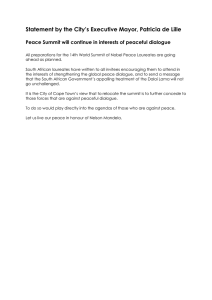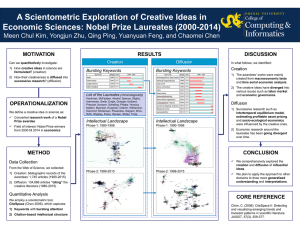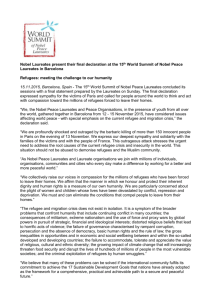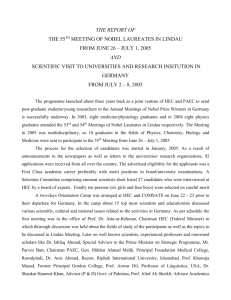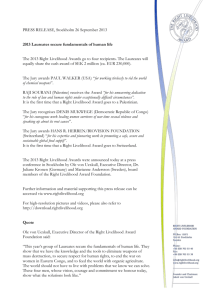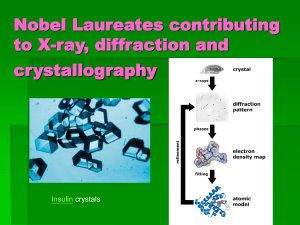Civil Society Space Report – Input Introduction 28
advertisement
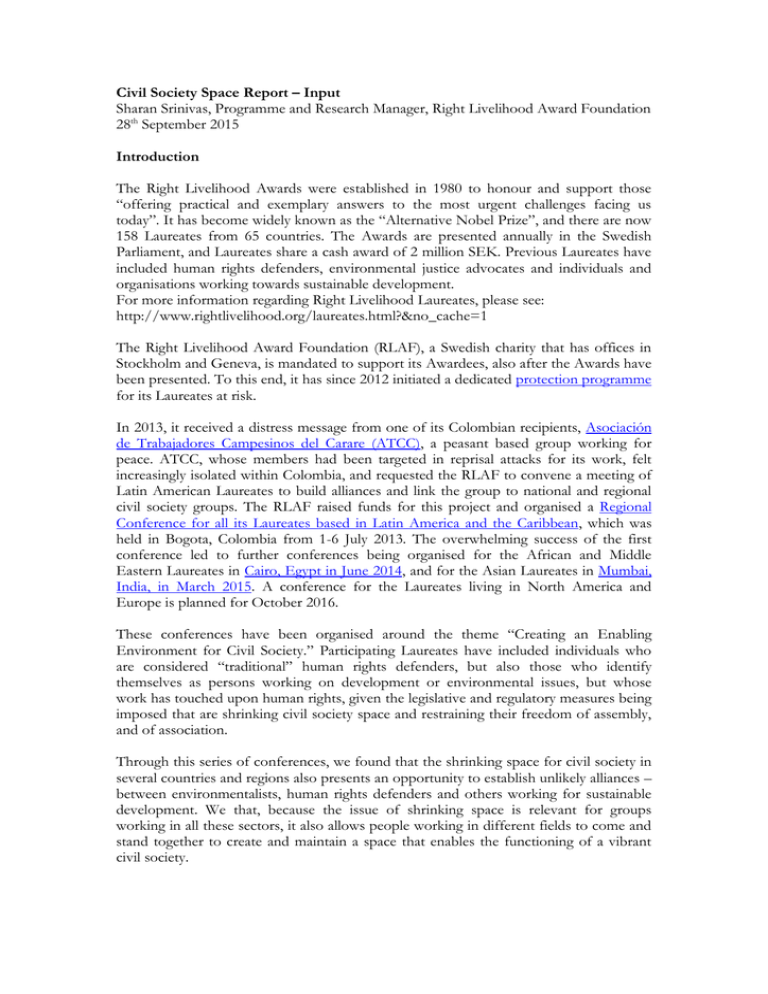
Civil Society Space Report – Input Sharan Srinivas, Programme and Research Manager, Right Livelihood Award Foundation 28th September 2015 Introduction The Right Livelihood Awards were established in 1980 to honour and support those “offering practical and exemplary answers to the most urgent challenges facing us today”. It has become widely known as the “Alternative Nobel Prize”, and there are now 158 Laureates from 65 countries. The Awards are presented annually in the Swedish Parliament, and Laureates share a cash award of 2 million SEK. Previous Laureates have included human rights defenders, environmental justice advocates and individuals and organisations working towards sustainable development. For more information regarding Right Livelihood Laureates, please see: http://www.rightlivelihood.org/laureates.html?&no_cache=1 The Right Livelihood Award Foundation (RLAF), a Swedish charity that has offices in Stockholm and Geneva, is mandated to support its Awardees, also after the Awards have been presented. To this end, it has since 2012 initiated a dedicated protection programme for its Laureates at risk. In 2013, it received a distress message from one of its Colombian recipients, Asociación de Trabajadores Campesinos del Carare (ATCC), a peasant based group working for peace. ATCC, whose members had been targeted in reprisal attacks for its work, felt increasingly isolated within Colombia, and requested the RLAF to convene a meeting of Latin American Laureates to build alliances and link the group to national and regional civil society groups. The RLAF raised funds for this project and organised a Regional Conference for all its Laureates based in Latin America and the Caribbean, which was held in Bogota, Colombia from 1-6 July 2013. The overwhelming success of the first conference led to further conferences being organised for the African and Middle Eastern Laureates in Cairo, Egypt in June 2014, and for the Asian Laureates in Mumbai, India, in March 2015. A conference for the Laureates living in North America and Europe is planned for October 2016. These conferences have been organised around the theme “Creating an Enabling Environment for Civil Society.” Participating Laureates have included individuals who are considered “traditional” human rights defenders, but also those who identify themselves as persons working on development or environmental issues, but whose work has touched upon human rights, given the legislative and regulatory measures being imposed that are shrinking civil society space and restraining their freedom of assembly, and of association. Through this series of conferences, we found that the shrinking space for civil society in several countries and regions also presents an opportunity to establish unlikely alliances – between environmentalists, human rights defenders and others working for sustainable development. We that, because the issue of shrinking space is relevant for groups working in all these sectors, it also allows people working in different fields to come and stand together to create and maintain a space that enables the functioning of a vibrant civil society. Key Findings of Regional Conferences of Laureates in Latin America, Africa and Asia 1. Regional Meetings are important – We found that even well known human rights defenders like Helen Mack Chang of Guatemala see value in meeting with other civil society activists from time to time. Many activists and public interest workers are feeling beleaguered and isolated, with their freedom to associate and seek foreign funding being increasingly restricted. At a time when States are sharing information and enacting legislation that curtail public freedoms, it is essential that international organisations facilitate platforms that allow for the sharing of successful strategies to create and maintain civil society space. Whilst thematic meetings e.g. gatherings of human rights defenders working on civil and political rights remain crucial, regional meetings, that bring together different civil society constituents - from environmentalists to public interest journalists to indigenous rights activists - are increasingly important to build the broad coalitions and movements required to create and maintain an environment for civil society to operate amidst increasing repression. 2. Meetings should be as inclusive as possible - The RLAF has made it a point to dedicate one and a half days at each regional conference to organise a dialogue between the Laureates who have gathered at the Regional Conference and other local NGOs and civil society groups to facilitate sharing of strategies. In this way, the city that hosts the conference benefits actively from the presence of international activists gathering there. The international activists can visibly show their solidarity with local movements and struggles, and both groups can benefit from sharing of experiences. We have also facilitated the creation and maintaining of post-conference email listservs, to act as “virtual civil society space”, that has allowed for the quick gathering of signatures for activists’ petitions, and for rapid mobilisation of support and solidarity when an activist is threatened for their work. 3. Universities should be actively engaged to provide a safe space for civil society dialogue- A concrete result of the Regional Conference in Colombia was the creation of a Right Livelihood College campus at the Universidad Austral de Chile in Valdivia, Chile. The Right Livelihood College is a project, which links academics and Laureates of the Right Livelihood Award. This initiative, which began at the Universiti Sains Malaysia in Penang, Malaysia in 2010, has now secured the participation of seven leading campuses across five continents. In this project, universities commit to hosting Right Livelihood Award Laureates, who deliver lectures and lead seminars. Additionally, Master’s and PhD students working on human rights and development are placed with Laureates for their field research. This enables the Laureate’s work to be analysed from a scientific perspective, strengthening their profile. Concurrently, small groups of Laureates working on similar issues can use participating universities as a safe space to share strategies and engage in conversations. Universities also invite other local civil society actors whenever these seminars are convened to ensure an inclusive dialogue. From our experience, we recommend that civil society engage with universities, as this facilitates both the dissemination of knowledge about civic struggles to the next generation, and also opens the doors to a new space for activists to gather at a time when rights to assemble and associate are being curtailed. 4. Unlikely alliances between civil society actors strengthen global movements for peace, rights and justice – The series of regional meetings that we have organised have brought together very diverse actors, from those who are fighting for economic, social and cultural rights to those who are advocating for the total abolition of nuclear weapons. The results of these interactions have been the development of some extremely unlikely alliances. Following a series of conversations at the 2014 Mumbai Regional Conference, 2009 Right Livelihood Laureate Alyn Ware managed to secure the support of Chinese social entrepreneur and 2011 Right Livelihood Award Laureate Huang Ming for his Wave Goodbye to Nuclear Weapons campaign. Similarly, our Nepalese Laureate Shrikrishna Upadhyay has through interactions at the regional conference secured the support of Laureates from China, Japan and India to support his advocacy with the Government of Nepal, to ensure that the post earthquake reconstruction in his country is firmly anchored on the principles of sustainable development. These examples illustrate how international alliances between civil society actors can create new spaces to advance and strengthen local struggles. Please do not hesitate sharan@rightlivelihood.org to contact me for further information at
